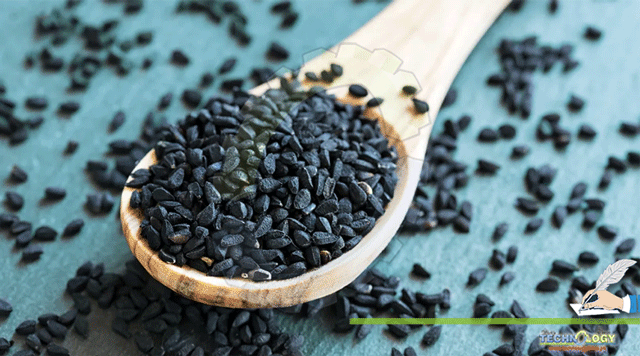The oil that we get from black cumin is very useful and beneficial for hair health, and it not only strengthens the hair from the roots but also gives it a shine.

Messenger of Allah Almighty said: “There is a healing in black cumin of everything except death” Black cumin is an annual flowering plant. The botanical name of black cumin seed is Nigella sativa.
Other names for black cumin:
There are also several other names for black cumin, e.g., black seed , black caraway, roman coriander, kalonji , fennel flower, etc.
Nutrients in black cumin:
• Black cumin is rich in antioxidants.
• It also contains many vitamins, including vitamin A, C, and K.
• In addition, black cumin seeds are also a source of calcium, potassium, phosphorus, magnesium, sodium, copper, zinc, iron, and manganese.
• It contains 20–85% protein, 38.20% fat, 7-94% fiber, and 34.98% carbohydrates.
Benefits of black cumin seeds:
• Consuming it daily with an empty stomach is better for brain function. It is very beneficial for older people to improve their weak memories.
• Ayurveda recommends consuming kalonji seeds with mint leaves, which can boost memory.
• It can be used in many dishes as a flavoring agent.
Black cumin oil:
• The oil that we get from black cumin is very useful and beneficial for hair health, and it not only strengthens the hair from the roots but also gives it a shine.
• The oil of black cumin is used to reduce inflammation.
• The oil of black cumin is used to treat many skin conditions.
• The oil of black cumin is used in many cosmetic products because it is good for making your skin healthy.
The therapeutic effects of black cumin
• Black cumin seed can treat different airway disorders.
• It can also treat chronic headaches and back pain.
• It is also effective in treating diabetes, paralysis, infection, inflammation, hypertension, and digestive tract-related problems.
• It can prevent neurological disorders like Alzheimer’s disease.
• It helps in reducing cholesterol, so ultimately it can also prevent many heart disorders.
• It also helps in relieving arthritic pain.
• It also helps to protect the liver from injury and damage. Kalonji mainly reduces the toxicity of chemicals in our bodies and protects against liver and kidney damage.
• Black cumin has certain antioxidants, which help neutralise certain free radicals in the body. These free radicals may contribute to the development of diseases like cancer, so ultimately, black cumin has the ability to prevent cancer.
• There are many bacteria present that pose a risk to lives and cause many infections or diseases. Black cumin has antibacterial properties.
• Kalonji could help preserve the lining of the stomach and prevent the formation of ulcers.
Can we eat black cumin daily:
• Black cumin intake is safe if we take it in small amounts. But the intake of large amounts of black cumin seeds leads to low blood pressure or low blood sugar levels, which pose a risk to lives.
Who cannot eat black cumin:
• One should not take black cumin if he or she has undergone surgery and has a plan to undergo surgery. During surgery or after surgery, it can pose a risk of bleeding and might hinder your surgery. Black cumin seeds also slow down the clotting process.
• Must consult doctor before taking black cumin seeds as a supplement if you are pregnant or nursing women or children.
• Must consult your doctor before taking kalonji seed with anticoagulants.
Can we grow black cumin at home?
Yes, we can grow black cumin at home. It is mainly grown for its aromatic seeds. It is used as a spice and for medicinal purposes. A warm climate with full sun exposure is preferable for black cumin. We can grow black cumin in well-drained soil with a pH of about 5.5 to 6.5.
Must ensure that the soil is fertile and rich in organic compounds. Plant seed about ¼ inch deep, and plant-to-plant spacing must be 6 inches. Keep the soil constantly moist but not waterlogged .
Must give water to the plant regularly, especially during dry periods. Once the seedlings get mature, thin them out to maintain proper plant spacing. One can also use fertilisers to promote the healthy growth of plants. Harvest the seeds when the seed pods become brown.
You must store the black cumin seeds in an airtight container or in a dry place.
Outdoor growth of black cumin:
The climate for the growth of black cumin should be warm. The pH of the soil for growth should be 5.5 to 7.5. At first, take the seed, and the seed must be free from disease and any kind of pest. Remove all the debris and weeds from the land, and you must till the land that you want to use for the growth of black cumin to a depth of about 6 to 8 inches.
Then plant the seed at the proper depth and maintain the plant-to-plant and row-to-row distances. Provide water to the plants daily, but avoid waterlogging because excess moisture can rot the roots.
Provide the proper amount of fertiliser and organic matter to the plant for better growth of black cumin. Harvest the pods when they become brown and start to split.
Store the seed in dry containers with proper ventilation. Excess moisture in storage places may affect the seeds because fungus grows in moist environments.